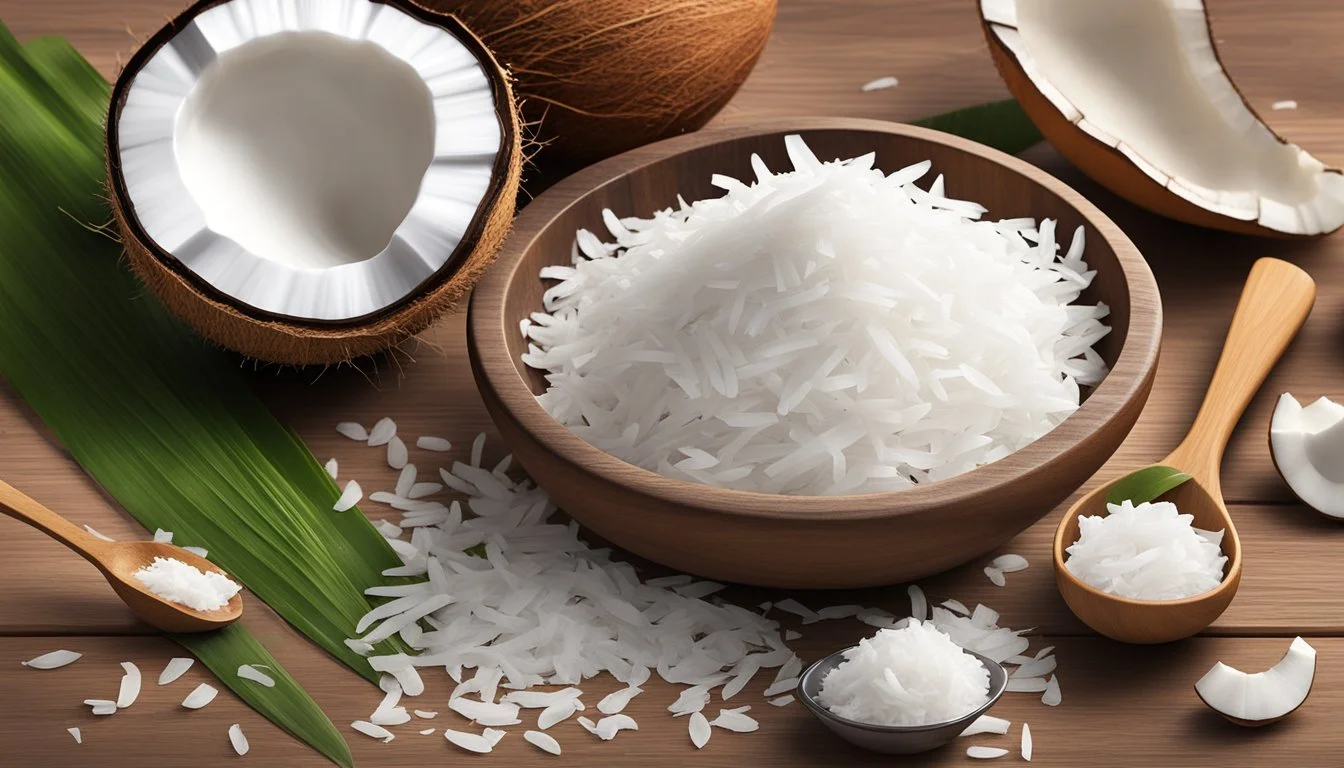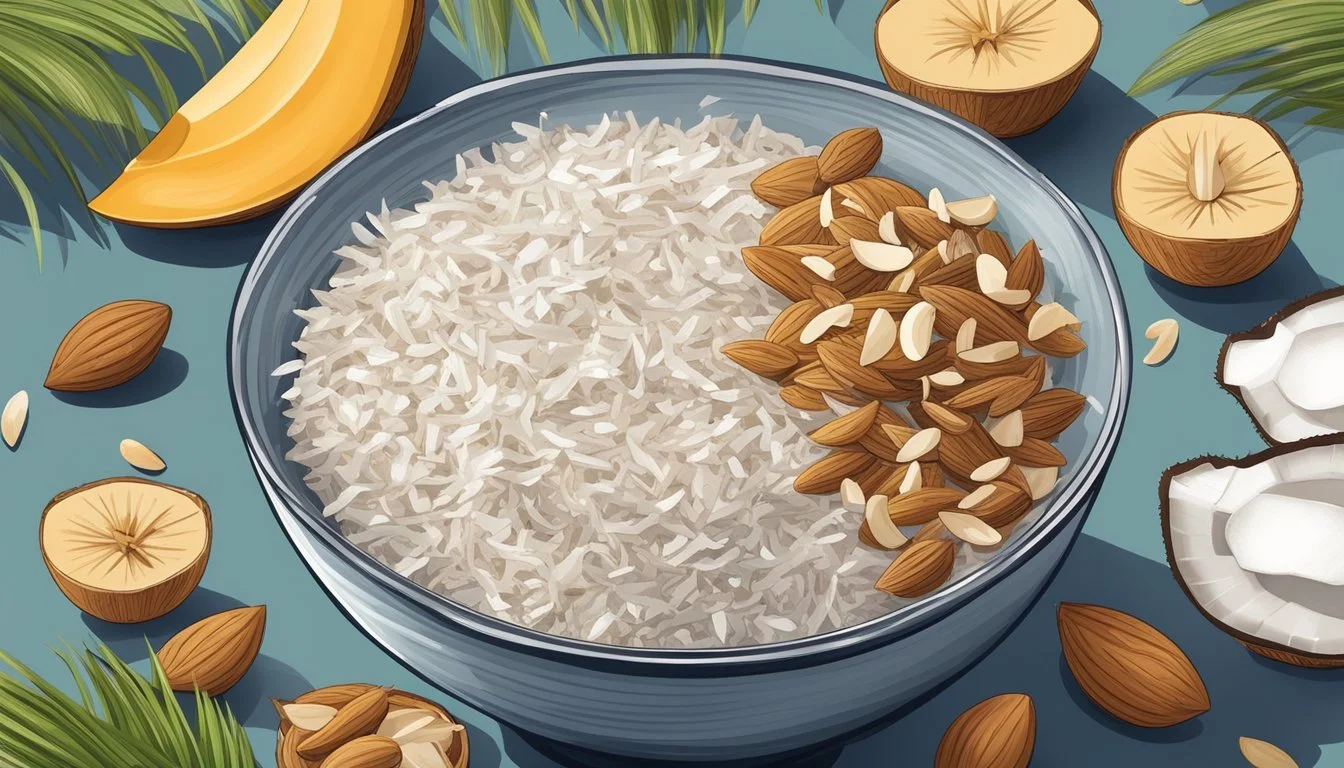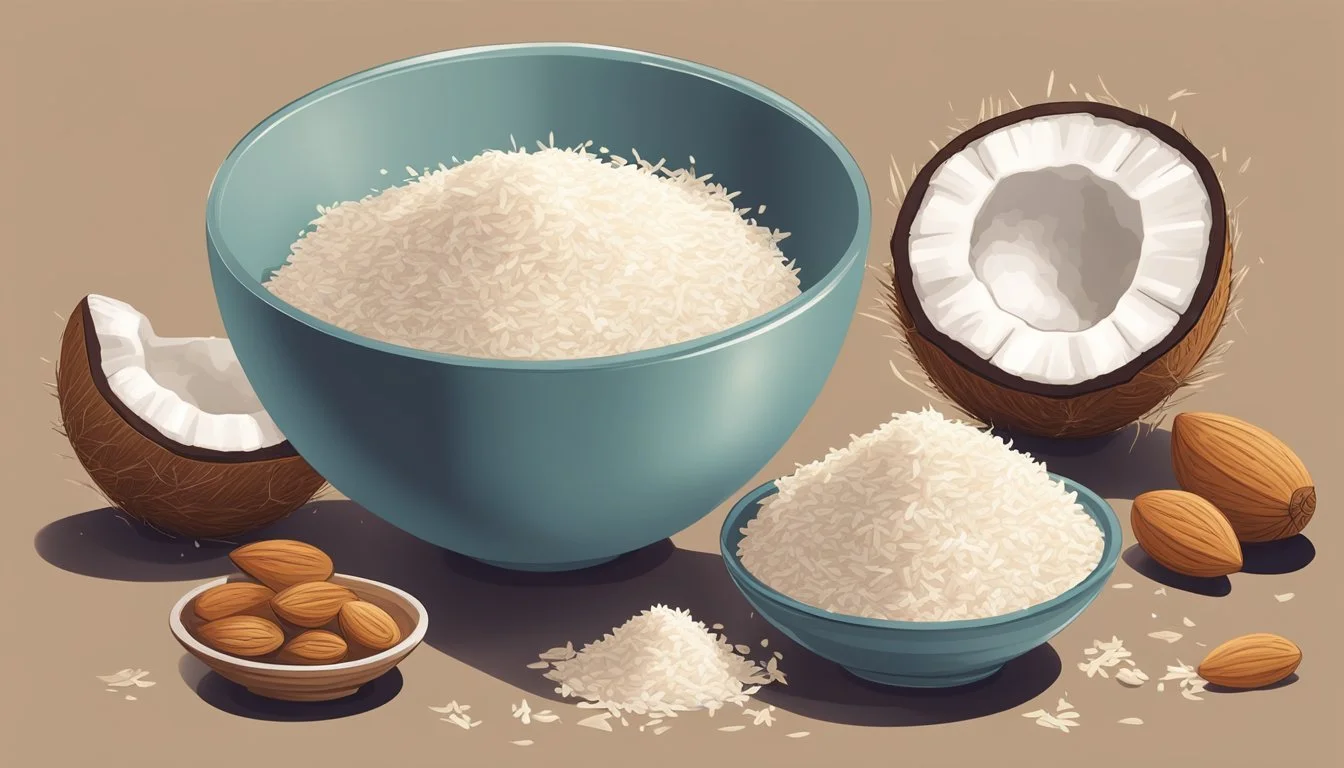Shredded Coconut Substitutes
Best Alternatives for Baking and Cooking
Finding the perfect substitute for shredded coconut can elevate your dish without compromising flavor or texture. Whether you're out of shredded coconut or catering to a dietary restriction, there are several versatile and delicious alternatives you can use. From grated white chocolate to chopped nuts, these substitutes can seamlessly replace shredded coconut in various recipes.
Coconut flakes and desiccated coconut are excellent options if you need something similar in texture and flavor. For those who prefer a nutty crunch, chopped macadamia nuts or Brazil nuts can be a delightful addition to your recipe. Each substitute offers its unique benefits, making it easy to find the right fit for your culinary needs.
Explore these alternatives and discover how easy it is to maintain the tropical essence of shredded coconut in your dishes. Leveraging these substitutes can ensure you never have to compromise on taste or texture.
Understanding Shredded Coconut
Shredded coconut is a common ingredient in many recipes, prized for its unique texture and sweet, tropical flavor. It plays a significant role in cooking and baking, offering nutritional benefits as well. Below, the discussion spans the types available, its culinary uses, and its nutritional profile.
Types of Shredded Coconut
Shredded coconut comes in various forms, each suited to different culinary needs. Unsweetened shredded coconut is pure coconut meat shredded into fine pieces and dried. It is often used in savory dishes where added sugar is not desired. Sweetened shredded coconut, meanwhile, is treated with sugar and preservatives, making it a popular choice for desserts and baked goods due to its enhanced sweetness.
Fresh shredded coconut can be prepared at home from fresh coconut meat. This type has a more intense flavor and higher moisture content compared to dried varieties. There are also organic and non-organic options, with organic providing an additive-free alternative for health-conscious individuals.
Role in Cooking and Baking
Shredded coconut excels as an ingredient in both cooking and baking. Its texture adds a chewy and slightly crunchy component to dishes which is particularly sought after in cookies, cakes, and pastries. It is also used as a decoration to garnish desserts, adding an appealing visual element.
In cooking, it can be used in savory dishes such as curries and salads where it introduces a mild sweetness and a tropical flavor. Shredded coconut is crucial in recipes like coconut macaroons, energy bars, and various confectioneries, providing flavor and texture.
Nutritional Profile
Shredded coconut is rich in nutrients that offer health benefits. It is a good source of dietary fiber, aiding in digestion. The healthy fats present in coconut, mainly in the form of medium-chain triglycerides (MCTs), are known for their beneficial effects on metabolism and energy levels.
Additionally, shredded coconut contains essential minerals such as iron, potassium, and magnesium. Vitamins E and B are also present, contributing to overall health. However, sweetened varieties can be higher in calories and sugar, making unsweetened or fresh shredded coconut a healthier option for regular consumption.
Substitutes Based on Texture
When looking for substitutes for shredded coconut based on texture, there are viable alternatives such as various nuts, seeds, grains, breadcrumbs, and oats. Each alternative is chosen for its ability to mimic the texture of shredded coconut while adding unique characteristics to your recipes.
Nuts as Alternatives
Nuts like macadamia nuts and brazil nuts provide a crunchy texture similar to shredded coconut. Chopped macadamia nuts add a rich, buttery flavor that's ideal for both savory and sweet recipes. Brazil nuts, when finely chopped, offer a firm crunch and subtle sweetness. Using nuts as an alternative enhances the nutritional profile with healthy fats and proteins.
Seeds and Grains
Seeds and grains, such as granola and chia seeds, offer varied textures that can replace shredded coconut in many dishes. Granola provides a crunchy texture that's suitable for toppings on yogurt, salads, and baked goods. Chia seeds, when combined with liquid, create a gel-like consistency that can be used in desserts and energy bars, adding slight crunch and nutrient density.
Breadcrumbs and Oats
Breadcrumbs and rolled oats make excellent substitutes due to their versatile textures. Plain breadcrumbs can replace shredded coconut when a dry and slightly crispy texture is desired, perfect for breading and topping dishes. Rolled oats, when lightly toasted, mimic the chewiness of shredded coconut and can be used in cookies, granola bars, and even sprinkled over smoothies for added substance. Ground oats can also simulate the finer texture of desiccated coconut.
Substitutes Based on Flavor
When looking for substitutes for shredded coconut based on flavor, it's essential to consider both the type of recipe and the desired taste profile. Here are several options split into three main categories: coconut product alternatives, sweet and nutty alternatives, and chocolate variants.
Coconut Product Alternatives
For those seeking to maintain a strong coconut flavor, coconut extract is an excellent substitute. This concentrated liquid captures the essence of coconut, making it ideal for recipes where a robust coconut taste is required.
Coconut milk, cream, and butter can also serve as alternatives. They provide a rich, creamy texture along with the desired coconuty flavor. These products work well in both savory and sweet dishes. For example, coconut milk is perfect for curries, while coconut cream can enhance desserts.
Coconut flakes are another great option. Although they are larger than shredded coconut, they deliver similar flavors and can be used in various recipes, from baked goods to granolas.
Sweet and Nutty Alternatives
If maintaining a nutty taste profile is crucial, several nut-based substitutes can be used. Chopped macadamia nuts offer a light, sweet, and buttery flavor reminiscent of shredded coconut. They work beautifully in desserts and baked goods.
Chopped or grated brazil nuts also present a robust, rich, and slightly sweet flavor. These nuts can be finely chopped to mimic the texture of shredded coconut. They can add a delightful crunch to your recipes.
For a sweeter twist, consider using white chocolate. Grated white chocolate can provide a sweet, creamy texture that complements many dessert recipes. Although it lacks the nutty undertones, it compensates with its rich flavor profile.
Chocolate Variants
Chocolate lovers can consider various chocolate-based substitutes. Shredded or grated white chocolate can bring a sweet, melt-in-the-mouth texture, enhancing the flavor of pastries and cakes.
Grated milk chocolate can also provide a sweet, rich taste, but it's less creamy than white chocolate. It pairs well with recipes where a blend of sweetness and a hint of cocoa is desirable.
Using these alternatives allows for flexibility in recipes while maintaining delicious flavor profiles. Choose the right substitute based on your flavor preference and the specific needs of your dish.
Substitutes in Special Diets
When looking for substitutes for shredded coconut in special diets, it's important to consider both gluten-free options and vegan or dairy-free replacements. Various alternatives can cater to these dietary needs while delivering texture and flavor.
Gluten-Free Substitutes
Desiccated Coconut: This offers a similar flavor and texture while being gluten-free. It's a reliable option for baked goods and desserts.
Chopped Nuts: Brazil nuts and macadamia nuts add crunch and a rich, buttery flavor. They are naturally gluten-free and can be used in recipes requiring shredded coconut.
Coconut Flour: Provides a subtle coconut taste and can be used in baking. It's essential to note that it absorbs more moisture, so recipe adjustments may be necessary.
Vegan and Dairy-Free Replacements
Coconut Extract: Enhances coconut flavor without adding dairy. Perfect for recipes needing a strong coconut scent and taste.
Grated White Chocolate: Although not coconut, it mimics the appearance of shredded coconut. Ensure it’s dairy-free by checking the product label.
Almond Flour: Another good option, almond flour adds a slightly nutty flavor and maintains a moist texture in baked goods. It's suitable for both vegan and dairy-free diets.
Using these substitutes ensures that special dietary needs are met without compromising the desired textures or flavors in your recipes.
Utilizing Substitutes in Recipes
Finding the right substitute for shredded coconut can maintain the intended texture and flavor of various recipes. This section covers how these substitutes can be adapted for both sweet and savory dishes.
Sweet Treats and Desserts
Desiccated coconut is a versatile choice for cakes, cookies, and granola bars. It has a drier texture but retains the rich coconut flavor, making it ideal for baked goods.
Another option is grated white chocolate, which adds a decadent touch to desserts and ice cream. It visually mimics shredded coconut but brings a milder, sweeter profile.
Chopped nuts, like almonds or pecans, can add a crunchy contrast in yogurt, smoothies, and oatmeal, providing a different but equally enjoyable texture.
Savory Dishes and Meals
For curries and sauces, coconut flakes are an ideal substitute. They can be easily blended to achieve a finer texture, ensuring they dissolve well in liquid-based dishes.
Coconut flour can thicken marinades or curry dishes, giving them a rich consistency while retaining the coconut flavor.
Finally, ground almonds or oats can be used in meat and fish dishes for a similar texture and a nutty undertone that complements savory flavors. They are particularly effective in coatings and breading.
These substitutes offer flexibility in adapting recipes without compromising on taste or texture, making them excellent alternatives in a variety of culinary applications.
Additional Considerations for Substituting Shredded Coconut
When substituting shredded coconut, it's essential to consider the impact on texture, moisture, and nutritional content. Various substitutes can alter the overall feel and nutrient profile of your dish, and it’s crucial to account for potential allergens.
Texture and Moisture Adjustment
Different substitutes may alter the texture and moisture levels of your dish. Desiccated coconut retains less moisture compared to fresh shredded coconut, so adjust liquid ingredients as needed. Chopped or grated nuts, like macadamia or Brazil nuts, provide a similar crunch but lack the inherent moisture of coconut.
Dried fruits like raisins or dates can add chewiness and sweetness but may introduce excess moisture. White chocolate delivers a similar visual appeal but dramatically shifts the texture and moisture dynamics due to its creamy consistency.
Nutritional Adjustments
Substituting shredded coconut can affect the nutritional profile of your recipe. Coconut is rich in healthy fats, vitamins, and minerals. Alternatives such as nut powders (e.g., almond flour) can offer some of these nutrients, but in different proportions. Powdered milk or coconut milk powder can provide some of the nutritional benefits without adding texture.
Substitutes like dried fruits bring additional sugars and fiber, potentially altering the nutritional balance. White chocolate introduces more sugars and fats but lacks significant vitamins. It's important to consider these changes to maintain the health benefits of your dish.
Allergic Considerations
Many shredded coconut substitutes are nuts, and it's vital to be aware of any nut allergies. Macadamia and Brazil nuts are common alternatives, but they pose a risk to those with nut allergies. Ensure to use coconut products like coconut extract or coconut flour if there is a concern over nut allergens.
Dried fruits are often safe alternatives but check for common allergens like sulfites, which are sometimes used as preservatives. Always verify ingredient lists to avoid any hidden allergens and ensure the substitute matches the dietary needs of those consuming the dish.






